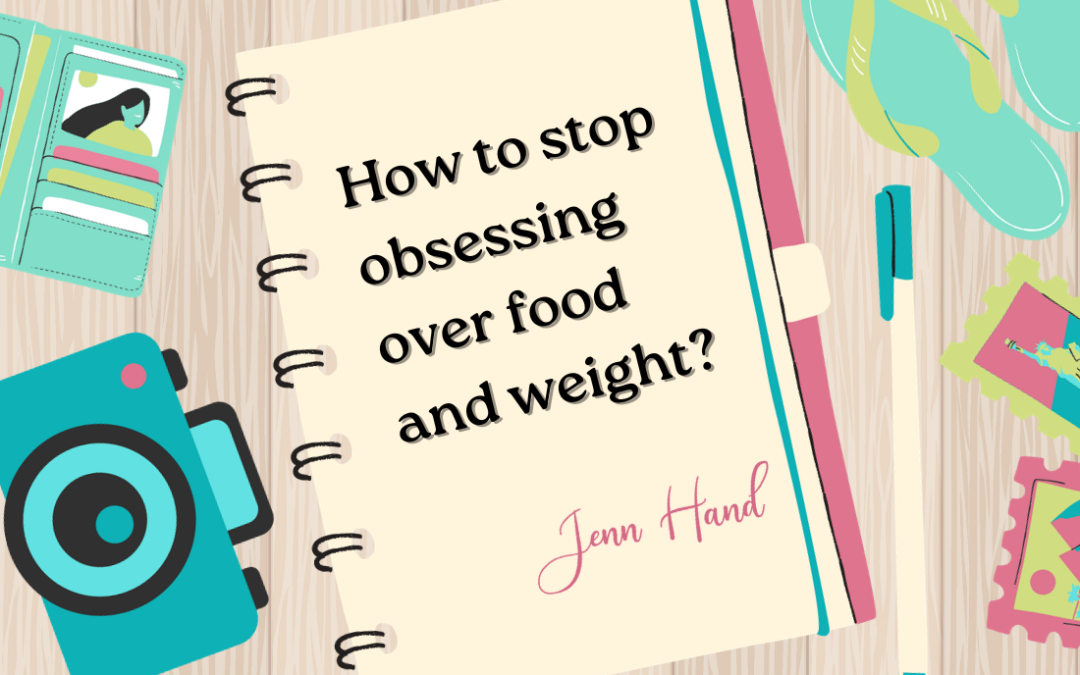Written by Jenn Hand, Holistic Nutritionist, Board Certified Health Coach, NBC-HWC
“How can I stop obsessing over food and weight!?”
In the throes of my battle with bingeing and dieting, there is one thing I desperately wanted: learn how to stop obsessing over food and weight.
I thought about what I was eating, not eating or should be eating 24/7. Thoughts of my body, shame of weight gain, self-consciousness around how I looked in clothes consumed my waking hours. Over time, as my obsessive thoughts eased and my feeling of space expanded, I felt more and more free. Below are the tips that helped me most!
Here are a few tips to help stop focusing on weight:
1. Measure yourself by more than your size
If we only see our physical reflection as who we are, we fixate more on weight.
Can you go beyond the scale and your size? What else makes you YOU? It can be helpful to explore journaling, affirmations, meditation and other ways to go deeper into who you are as a person.
2. Focus on health rather than weight.
You can cultivate healthy lifestyle choices without it being directly focused on weight.
The more we obsess over “results” or trying to “fix” our bodies, the more we feel out of balance around food. Instead, can you make health the main theme? Rather than choosing exercise or food to achieve a certain weight, can you choose based on how nourishing it feels to your body?
3. Ditch the scale
I mean this in a literal sense!
Throw it out, hide it under a heap of clothes in the closet or lock it away some place where you don’t see it. Giving up the scale was life changing for me and helped me immensely to shift my focus off of weight and the roller coaster of emotions around weighing and into living.
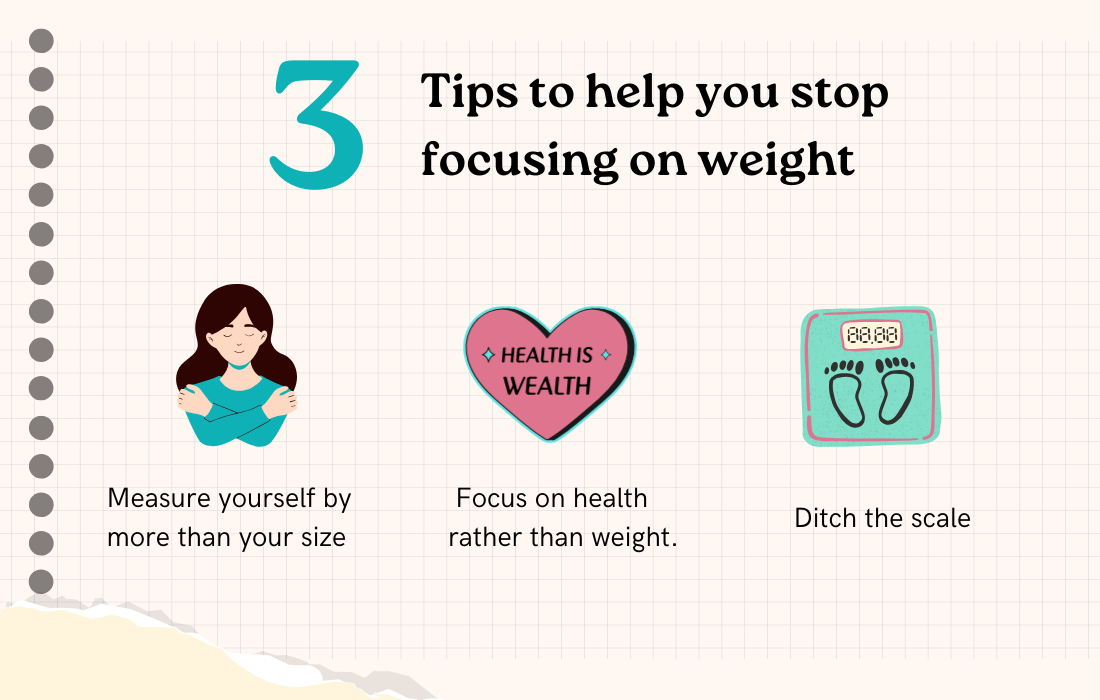
Here are a few tips to help you stop obsessing over food:
1. Aim for balance, not a diet
When we go on something, we inevitably go off.
And each and every diet we start, we “fail,” and then we get caught in a cycle where we become even more obsessed with controlling our food. Whatever you do, resist the temptation to diet! Aim for balance and nourishment instead.
2. Explore satisfaction in how you eat
The more satisfied we are, the less we think about food later.
What contributes to feeling satisfied after a meal? Ensuring you’re having enough protein, eating foods you genuinely like, and listening to what your body needs fuel wise.
3. Look at taking care of yourself vs controlling your food
When we can shift into a mindset of “care” it feels very different than “control.”
Control feels rigid, harsh and filled with rules. Learning to take care of the body feels nourishing, curious, and gentle. You can still eat healthful foods, it’s just about learning to care for yourself rather than control yourself!
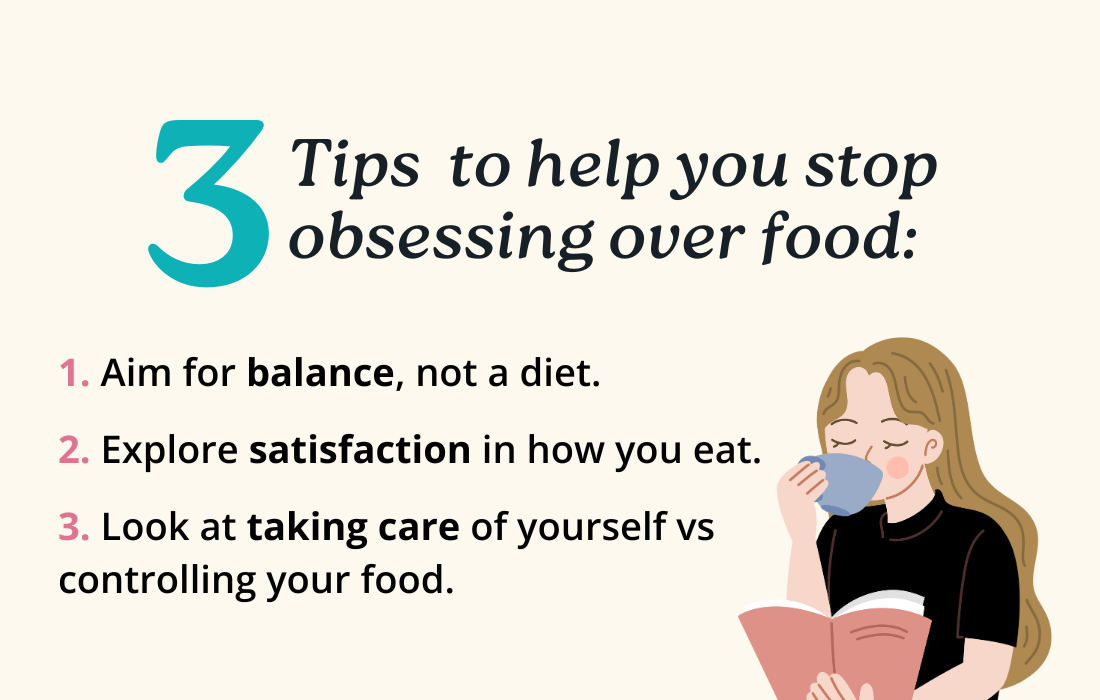
Breaking the Cycle of Obsessive Eating
A client of mine, Sarah, struggled with an intense obsession with food that controlled her life.
She constantly counted calories and felt guilty after every meal. While she was a mom with 3 kids, she felt like all of her energy was spent trying to stop bingeing, planning a diet, and cycling through the feeling of failure when she couldn’t stick to it.
She felt ashamed that she thought of food more than she thought about her kids.
Through our work together, Sarah began to slowly move out of the cycle and into more balance–learning to trust her body’s hunger and fullness signals.
Over time, she found freedom from her food obsession and embraced a healthier, more balanced approach to eating. She began to spend more time and energy on her kids rather than on food.
What Can Provoke a Food Obsession?
Thinking about food all the time can be triggered by various factors, including restrictive dieting, emotional stress, and societal pressure to maintain a certain body image.
Diet culture, which promotes an unhealthy fixation on weight and appearance, can lead to obsessive food thoughts.
Additionally, personal experiences such as trauma or low self-esteem can push us to seek comfort in food, further fueling obsessive thoughts.
Understanding these triggers is the first step toward addressing and overcoming food obsession.
How to Avoid Triggers That Fuel Food Obsession
Avoiding triggers that fuel food obsession involves identifying people, places or situations that trigger you and creating a supportive and nurturing environment for yourself.
This can include unfollowing social media accounts that promote diet culture, avoiding conversations centered around dieting or weight loss, and steering clear of environments that encourage restrictive eating.
It’s also helpful to identify personal triggers, such as stress or boredom (or maybe it’s a specific person or situation), and develop a plan to deal with the trigger so you feel prepared in the moment. By proactively managing these triggers, you can reduce obsessive thoughts and develop a healthier relationship with food.
What Does Building a Healthier Relationship with Food Look Like?
Building a healthier relationship with food means shifting your mindset from viewing food as the enemy to embracing it as nourishment.
We want to work WITH our bodies, not against them. It involves listening to your body’s hunger and fullness cues and allowing yourself to eat a variety of foods without guilt. It’s about letting go of the all or nothing thinking, food rules that don’t serve you and other habits that don’t feel nourishing.
Ultimately, a healthy relationship with food is about balance, enjoyment, and trusting your body’s natural signals.
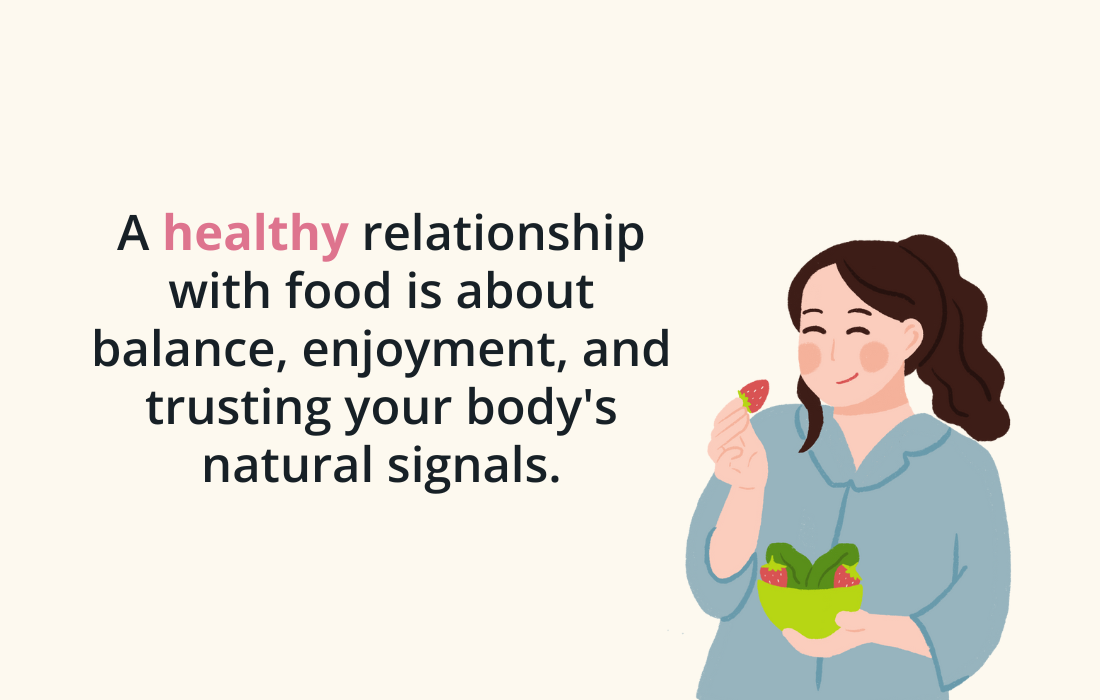
How Meal Patterns Influence Your Thoughts on Food
Your meal patterns can significantly influence your thoughts on food.
Regular, balanced meals help stabilize blood sugar levels, reducing the likelihood of intense cravings and obsessive thoughts.
Skipping meals or following erratic eating patterns can lead to increased hunger and preoccupation with food, often resulting in bingeing.
The longer we go without eating, the more likely we are to end up obsessing over food later…our bodies need fuel and when we deny that need, the body responds!
Establishing consistent meal times and incorporating a variety of nutrients in your diet can promote a more relaxed and positive attitude toward food.
Redirecting Obsessive Thoughts About Eating
Redirecting obsessive thoughts about eating requires a combination of mindfulness practices and positive self-talk.
Techniques such as deep breathing, meditation, and journaling can help you become more aware of your thoughts and shift your focus away from food.
Engaging in activities that bring joy and fulfillment, like hobbies or socializing, can also divert attention from obsessive thoughts.
Over time, these practices can help you develop a more balanced and peaceful relationship with food. One of my favorite ways to process obsessive food thoughts is journaling about emotions and what’s going on inside.
Managing Hunger and the Homeostatic Pathway
Managing hunger effectively involves understanding the homeostatic pathway, which regulates your body’s energy balance through hunger and satiety signals.
Eating regular, balanced meals ensures that your body receives consistent energy, preventing extreme hunger that can lead to overeating.
Paying attention to these signals and responding appropriately helps maintain a stable internal environment, reducing the likelihood of obsessive thoughts about food. Incorporating nutrient-dense foods that provide lasting energy can further support this balance.
Recognizing Eating Disorders Linked to Obsessive Behaviors
Signs of an eating disorder can include extreme preoccupation with food, weight, or body image, engaging in restrictive dieting, and experiencing guilt or shame after eating.
Other indicators might be significant weight fluctuations, withdrawal from social activities involving food, and physical symptoms like fatigue or digestive issues. If you or someone you know exhibits these behaviors, seeking professional support from a therapist or dietitian can be a vital step toward recovery.
You Can Stop Obsessing Over Food and Weight
While it can seem impossible when you’re in the thick of the food obsession, you can move beyond it!
It’s a road of 1000 baby steps, each one feeling small but adding up over time to create the change you want. Understand that this journey takes time and patience–see if you can surround yourself with supportive individuals and seek professional guidance if needed.
By shifting your focus from dieting to nourishing your body and mind, you can find freedom and feel like a “normal” eater!
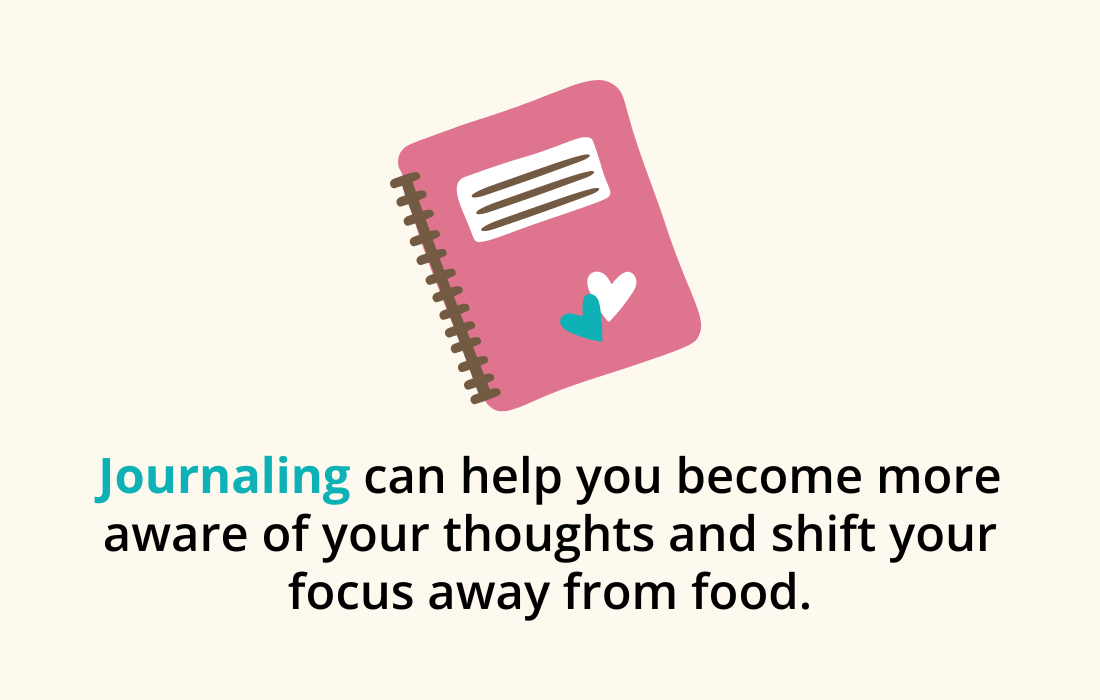
Common Questions About How to Stop Obsessing Over Food and Weight
How can I differentiate between a healthy interest in food and an unhealthy food obsession?
A healthy interest in food involves enjoying meals and being mindful of nutrition, whereas an unhealthy obsession dominates your thoughts, dictates your actions, and creates anxiety around eating.
Is being obsessed with healthy eating a form of “disordered” eating?
Yes, being overly fixated on healthy eating, known as orthorexia, can be a form of disordered eating that impacts your mental and physical well-being.
Are there actually any foods that someone should avoid if they are trying to be healthy and not just focus on weight loss?
Instead of categorizing foods as entirely off-limits, focus on moderation and balance, allowing yourself to enjoy a variety of foods without guilt. Instead of good and bad, can they be reframed to look at how each feels or impacts your own body?
What does eating balanced meals look like?
Eating balanced meals involves including a variety of macronutrients like proteins, carbohydrates, and fats, along with plenty of fruits and vegetables to ensure you’re getting diverse nutrients.
I always recommend starting with eating protein and carbs every 3-4 hours to help begin to find balance!
Can avoiding certain triggers help reduce my meal-related anxiety and food obsession?
Yes, identifying and avoiding specific triggers can help reduce meal-related anxiety and food obsession, allowing you to enjoy food more peacefully.
Does avoiding certain foods actually make food obsession worse?
Avoiding certain foods can intensify food obsession by making them seem more desirable and increasing the likelihood of bingeing when you eventually eat them.
If I tell you not to think of a pink elephant, what do you immediately think of? A pink elephant. The same is true when we say “do not eat break”…we immediately want to eat bread!
What mindset tools can help me stop obsessing over food and focus on balanced meals?
Mindset tools like practicing mindful eating, using positive affirmations, and setting realistic, compassionate goals can help shift your focus from obsession to balance.
Working to break food rules can help take the charges out of certain foods, which softens the 24/7 repetitive tapes in the mind.
What role does the homeostatic pathway play in food obsession?
The homeostatic pathway regulates hunger and satiety signals, and disruptions in this pathway can contribute to obsessive thoughts about food and irregular eating patterns.
How can a professional help me work through my obsession with food and any eating disorders that I might have?
A professional can provide personalized guidance, therapeutic support, and evidence-based strategies to help you address and overcome food obsession and eating disorders.
Someone who deeply understands your struggle can provide great insight into helping you move forward.
Are there specific meal-planning strategies that can help me if I’m dealing with a food obsession and have a history of avoiding foods due to it?
Yes, creating a flexible meal plan that includes a variety of foods you enjoy, practicing portion control, and gradually reintroducing avoided foods can help you manage food obsession and develop a healthier relationship with eating.
I always say that a gentle plan helps you be prepared but try to always remain flexible if the plan needs to change!
Read More
🌷 How to Have Willpower with Food
🌷 What to Do After a Binge Relapse
Work with a Binge Eating & Holistic Nutrition Coach
Overcome Bingeing and Emotional Eating, and Break Up with Yo-yo Dieting
Working with a binge eating coach and holistic nutritionist can help you get free from the frustrating binge and restrict cycle and stop yo-yo dieting.
You don’t have to be obsessed with food or have a million rules around eating to find your natural weight and learn to love your body. Ready to actually see a lasting change and experience true freedom?
Learn about Binge Eating CoachingAbout the Author:
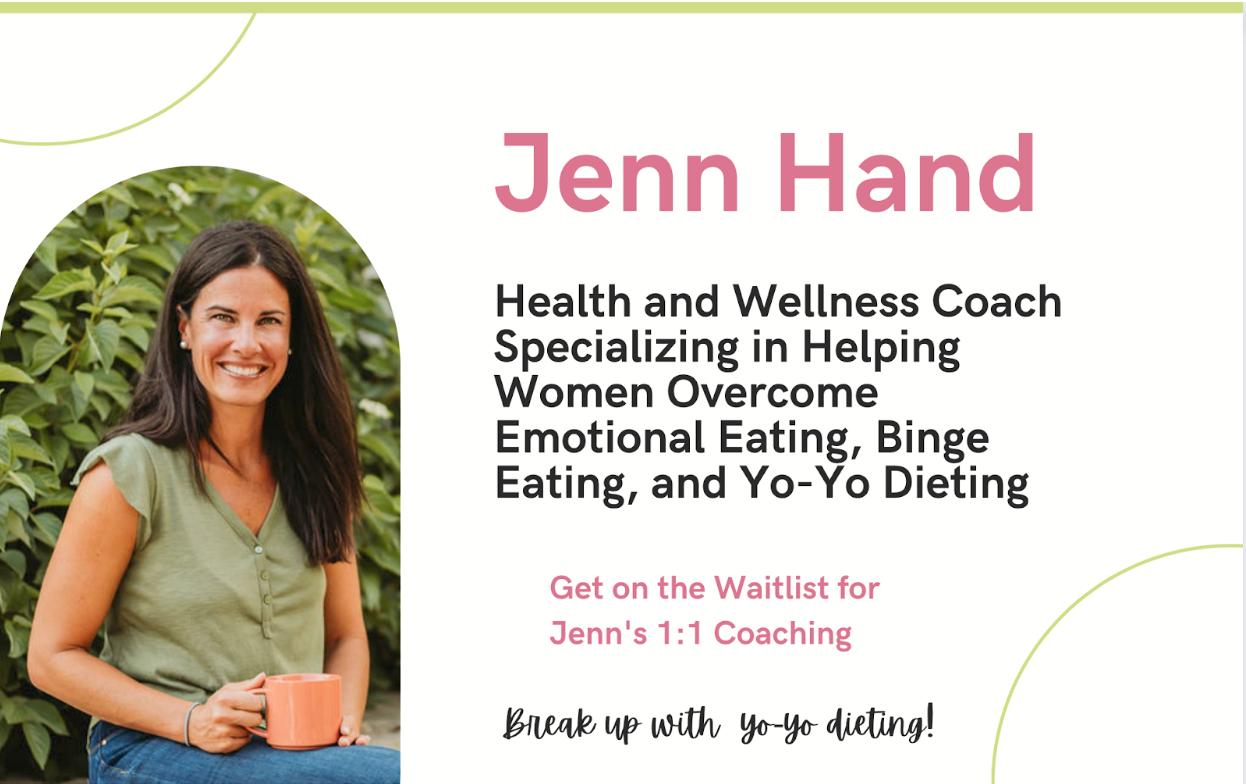
Jenn Hand has been helping women like you become normal eaters since 2015.
She’s worked with thousands of women, helping them to balance their bodies, end bingeing, stop obsessing over food, and start feeling amazing again. As a board-certified health coach and holistic nutritionist, Jenn knows how to support you in making real positive changes that last.
Her articles have been published on Mind Body Green, Tiny Buddha, Thrive Global and other local and global media platforms. She’s the author of How to Be a Normal Eater and the creator of The Normal Eater’s Club program. Listen to Jenn’s advice and tips on the Cake Doesn’t Count Podcast, or read more of her articles for free on the Food Freedom Blog.
Learn about Binge Eating Coaching
